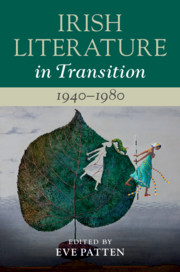Book contents
- Irish Literature in Transition, 1940–1980
- Irish Literature in Transition
- Irish Literature in Transition, 1940–1980
- Copyright page
- Contents
- Contributors
- Series Preface
- General Acknowledgements
- Introduction
- Part I After the War: Ideologies in Transition
- Chapter 1 The War Observed
- Chapter 2 Outside the Whale: Seán O’Faoláin, Totalitarianismand the European Public Intellectual
- Chapter 3 Irish Writers and Europe
- Chapter 4 Becoming a Republic: Irish Writing in Transition
- Part II Genres in Transition
- Part III Sex, Politics and Literary Protest
- Part IV Identities and Connections
- Part V Retrospective Frameworks: Criticism in Transition
- Index
Chapter 4 - Becoming a Republic: Irish Writing in Transition
from Part I - After the War: Ideologies in Transition
Published online by Cambridge University Press: 28 February 2020
- Irish Literature in Transition, 1940–1980
- Irish Literature in Transition
- Irish Literature in Transition, 1940–1980
- Copyright page
- Contents
- Contributors
- Series Preface
- General Acknowledgements
- Introduction
- Part I After the War: Ideologies in Transition
- Chapter 1 The War Observed
- Chapter 2 Outside the Whale: Seán O’Faoláin, Totalitarianismand the European Public Intellectual
- Chapter 3 Irish Writers and Europe
- Chapter 4 Becoming a Republic: Irish Writing in Transition
- Part II Genres in Transition
- Part III Sex, Politics and Literary Protest
- Part IV Identities and Connections
- Part V Retrospective Frameworks: Criticism in Transition
- Index
Summary
Mid-century Ireland was a society of surreal contradictions: an island that declared neutrality an emergency, a nation that became a republic by accident. This chapter examines how Irish writers responded to and reimagined the political and ideological contours of both states on the island in the post-war period, and in particular the creation by artists of altered states in which to seek refuge from the foreclosed reality of official Ireland(s). It charts the responses made by a group of writers whose themes ranged from a historical sense of dislocation and the search for a voice and an audience to an openness to vision and a careful attention to the environment. Initially discussing the novels of Elizabeth Bowen, Brian O’Nolan and Edna O’Brien, it outlines how they conceived of their roles within and beyond the nation in this time of change. The chapter then discusses how the outbreak of the Troubles in Northern Ireland provided the backdrop and impulse for new collective aesthetic projects in these later decades, such as the Field Day project and Atlantis magazine, that advanced the use of literature to imagine alternate Irelands beyond the pale of state and nation.
Keywords
- Type
- Chapter
- Information
- Irish Literature in Transition, 1940–1980 , pp. 83 - 100Publisher: Cambridge University PressPrint publication year: 2020

